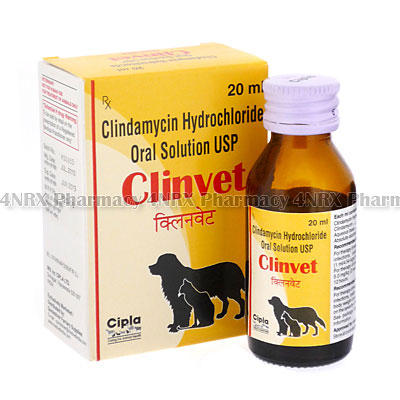 |
Home  4NRX Pet Pharmacy 4NRX Pet Pharmacy  Clinvet (Clindamycin) Clinvet (Clindamycin) |
|
|||||||||
|
Clinvet (Clindamycin)
What is Clinvet (Clindamycin) used for? Clinvet (Clindamycin) is an antibiotic solution, which is administered orally to dogs and cats as a treatment for a wide range of infections. This solution is effective in treating bacterial infections of the skin, deep wounds caused by various types of bacteria, and dental infections occurring in dogs and cats. It is also given to dogs to treat osteomyelitis. How should I use Clinvet (Clindamycin)? Clinvet (Clindamycin) comes in the form of a solution, which should be administered to your dog or cat, exactly as directed by the prescribing vet. The dosage depends on the weight of the animal. Cats require a different dosage than dogs. If you are giving this to a dog, the normal dose is 2.5mg to 15mg per pound, given at 12 hour intervals. You should discontinue use if you don't notice any improvement after 3 to 4 days. Treatment of osteomyelitis in dogs normally lasts 28 days, and the dosage for treating this condition is 5mg to 15mg per pound. If you are using this solution to treat a cat, the normal dose is 5mg to 15mg per pound, given at 24 hour intervals, for a maximum duration of 14 days. You should always take your animal to see a vet before you give it this solution, so that the correct dosage can be prescribed. What are the side effects of Clinvet (Clindamycin)? Side effects which may occur in animals who have been given Clinvet (Clindamycin) are generally uncommon, however some animals may experience diarrhea or vomiting. Take your animal to see a vet if you are worried about side effects. Please Note This solution is only to be given to animals. It should never be given to or taken by humans. Strictly follow all instructions provided to you by the prescribing vet while giving Clinvet (Clindamycin) to your animal. Optimum and safe dosage can differ based on the animal and the condition it is being treated for. As this medication may be unsafe for certain animals, it is essential you always inform the vet if your animal is used for breeding and is pregnant or lactating, as well as if it has any allergies, other illnesses, or ongoing health conditions, and if it is being given any other form of medication, supplements, or herbal products. Immediately seek emergency veterinary care if your animal has any allergic or hypersensitive reaction. Common signs of a reaction in animals include hives, swelling, skin rashes, chest pains, as well as trouble breathing or swallowing. 
|
|||||||||||||||||